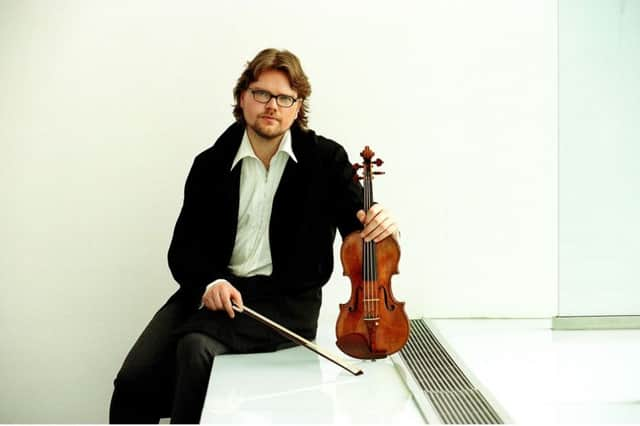Alexander Janiczek in front and behind the baton


It’s a bit like a film director not only setting the rules for their production, but also taking a lead role in it. Like Spike Lee in Do the Right Thing, Clint Eastwood in Unforgiven, Kenneth Branagh in countless Shakespeare adaptations.
That’s not to line up Austrian-born violinist Alexander Janiczek next to Hollywood’s glitterati – and in any case, he’s far too serious and thoughtful a music maker to go for such glitzy company. But in his three concerts of Mozart, Beethoven and Stravinsky with the Scottish Chamber Orchestra later this week, he’ll be sitting at the front of the first violins, directing the band, and also playing all the music at the same time.
Advertisement
Hide AdBut if you think it’s all about egotism, that’s far from the truth. “One of the first things that comes into my head about the programme we’re doing is – it’s a lot of notes!” he says. “Of course there’s an idea in my head about how I want the music to go which is the same as if I were a conductor, but I have to mediate that through my own playing – and of course I have to play all the notes as well.”
It’s quite a different set-up from a traditional orchestral concert, where a conductor stands out front directing with his (and it usually is his) movements, which are interpreted by the orchestral musicians, led by the concertmaster sitting at the front of the first violins. But simultaneously playing and directing is a role that Janiczek relishes – and one that he’s had a long history of fulfilling, under earlier encouragement from his mentor, legendary violinist-conductor Sandor Végh, at the Camerata Salzburg. “He had a very unconventional style of conducting – much more like spiritual guidance through a piece than anything else. He’d stop beating time in the middle of the concert if he felt like it.”
CONNECT WITH THE SCOTSMAN
• Subscribe to our daily newsletter (requires registration) and get the latest news, sport and business headlines delivered to your inbox every morning
And as a previous concertmaster of the SCO himself, and now as one of the orchestra’s broad roster of associate artists, Janiczek has deeply developed relationships with the SCO musicians. “If the players take the challenge of working without a conductor on board – which the SCO definitely does – then I think it can be very fulfilling for the audience. There’s more energy, and the listeners’ connection with the music can be much stronger.”
He acknowledges, though, that the absence of a performance’s traditional focus can be disconcerting. “For the audience, it might seem as though there’s a gap on the stage, a visual focus that’s lacking. But the focus is actually the music itself, rather than the conductor standing in the middle. I’ve found it interesting that in reviews of these concerts, critics sometimes say that the orchestra sounded very free and everyone played their individual parts brilliantly – which of course can also be true when there’s a conductor, but it seems more obvious where there isn’t one.”
There are different demands for the orchestral musicians, though. “There’s a huge amount of trust in the situation because everyone is dependent on every part of what’s going on. It’s quite a social set-up. Everyone’s less concerned about trying to provide what the conductor wants, and more actively involved and engaged with the music itself. As a playing director, you have to be really open if someone says they want to play something in a particular way, while still thinking of the bigger picture. But it can be extremely rewarding for everyone if it works.”
Advertisement
Hide AdThings are more complicated still with these concerts, though. Across all three concerts, Janiczek directs Stravinsky’s Concerto in D (a soloist-less work, despite its name, written for string orchestra) and Mozart’s Paris Symphony No 31, both from the concertmaster’s seat. “The Stravinsky needs a different kind of directing from the Mozart – with the Mozart we’re talking about phrasing, whereas in the Stravinsky it’s really all about rhythm,” he says.
But to complete the programme, he also appears as a soloist himself (alongside the SCO’s principal violist Jane Atkins) in Mozart’s Sinfonia concertante, K364, as well as directing the orchestra for another soloist – Welsh pianist Llyr Williams – in Beethoven’s Second Piano Concerto. “In the Beethoven, I’ll have more of an accompanying role,” he explains, “trying to keep the orchestra organised and together for Llyr.”
Advertisement
Hide AdThe two men are regular partners in chamber music. “I get a lot out of working with Llyr when we play recitals together,” says Janiczek. “What I really admire is the strong musical message that comes from him, put together with so much careful thought and feeling.”
• Alexander Janiczek directs the Scottish Chamber Orchestra at the Queen’s Hall, Edinburgh, 15 January; City Halls, Glasgow, 16 January; and Aberdeen Music Hall, 17 January
SCOTSMAN TABLET AND IPHONE APPS